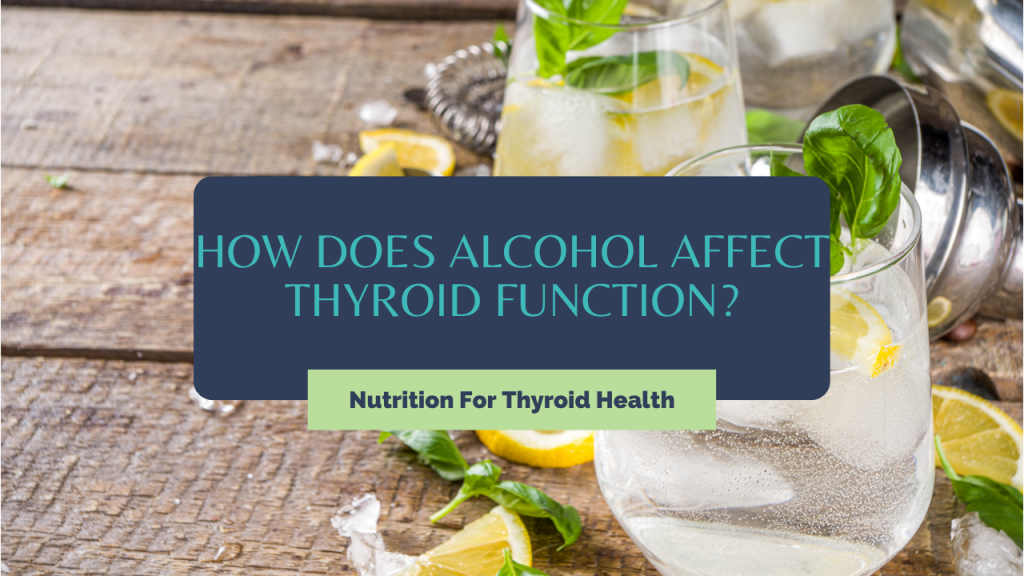How Does Alcohol Affect Thyroid Function?
It’s safe to say that over the past couple of years, people may have been reaching for alcohol more often than usual. Whether due to boredom, anxiety due to the pandemic, or the celebration of a return to in-person gatherings, the drinks have been flowing.
Unfortunately, along with that, there’s the potential for anxiety, depression, decreased thyroid functioning, and other health issues.
While drinking in moderation can work for some people, it can also be problematic under certain circumstances. If you’re struggling with autoimmune thyroid issues, for example, alcohol isn’t going to be your friend. It’s also not helpful if you have undue stress in your life, in which case alcohol may make matters worse.
Why Alcohol and Thyroid Don’t Mix
Alcohol directly affects what’s called the hypothalamus pituitary axis, aka HPA. People who consume alcohol on a regular basis are directly affecting this pathway, messing with important brain chemicals like serotonin and dopamine. In time, because our bodily systems are interconnected, chronic alcohol consumption can negatively impact your thyroid.
So if you’re having a glass of wine as you cook dinner or enjoying a glass among friends, how much is too much?
It depends. If you suspect you’re experiencing the negative effects of alcohol, including anxiety, depression, or an underperforming thyroid, it might be beneficial to cut out alcohol, at least for now. Let’s take a closer look at why.
Alcohol Is a Known Toxin
Alcohol, whose key intoxicating ingredient is ethanol, is known to have a direct, toxic effect on the thyroid gland. Consider for a moment that one of the treatment options for thyroid cancer is ethanol ablation, which can kill off the part of the thyroid gland that is not functioning well.
That should tell you something, right?
So if you are someone who is struggling with getting your thyroid optimized, medications leveled, and symptoms in check, you would do well to avoid alcohol, even in moderation. Although ironically, moderate alcohol consumption can actually reduce thyroid cancer risk, you might want to avoid drinking until you can get your thyroid optimized.
So what can you do instead of popping the cork? I’ve got five tips:
1. Remove alcohol completely to get to the root of your thyroid problems.
When we drink, the alcohol has to be processed by the liver, and in part, so do your thyroid hormones. Your liver will prioritize processing alcohol and eliminating the toxin from your system over hormone conversion. This means your hormone conversion will be put on the back burner for several hours after drinking alcohol.
2. Work to improve your liver health.
Fill your plate with healthy, whole foods, with a focus on colorful, antioxidant-rich plant foods that help with detoxification. Add turmeric to your foods, combined with black pepper to aid absorption. Oh, and drink filtered water.
3. Do a specific liver detoxification/gut health protocol.
I’m not talking about a colon cleanse here; a safe, carefully designed detoxification will help you clean out your body and improve gut health so you can start from scratch. I guarantee if you clean up your liver and the foods you’re eating, a lot of your symptoms will start to fall away.
4. Carefully experiment with alcohol.
I’m never going to be one to say that no one should ever drink alcohol again, because that’s not realistic for a lot of people. Barring any addiction issues, you may wish to experiment with alcohol to add it back.
However, you need to pay close attention to how alcohol impacts your sleep, your day-to-day functioning, and other factors. How did you recover the next day? What kind of alcohol were you drinking?
5. Use better quality alcohol.
Organic wines and clear liquors are slightly better options than, say, non-organic wines that have additives or drinks that contain added sugars. Vodka and soda with lime is a better choice than vodka with a sugary mixer, for example. With sugary drinks, you’re not only processing the alcohol, but also the fructose, putting extra load on your liver.
Really, it’s a matter of trial and error, and then sticking with what makes you feel the best. For some people, drinking a couple of times a week isn’t a big deal, but for others, it’s too much.
In part, it’s a matter of building new habits that support your thyroid and overall health. If you regularly consume alcohol and you’re experiencing signs of thyroid dysfunction, such as brain fog, anxiety, depression, or poor gut health, consider abstaining for a while. You might just find that you feel so amazing, you no longer crave that nightly drink.
Be sure to sign up for a free guide to fight fatigue with five easy ways to conquer your sleep and banish fatigue for good by clicking on this link.
How Does Alcohol Affect Thyroid Function? Read More »


